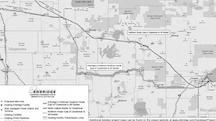
By Brett Larson, September 14, 2015
The Minnesota Court of Appeals has ruled that the Minnesota Public Utilities Commission violated state law by issuing a certificate of need for the Sandpiper oil pipeline.
A three-judge panel released the decision Monday, Sept. 14, stating that the Minnesota Environmental Policy Act (MEPA) requires an environmental impact statement (EIS) prior to granting of a certificate of need for “a major governmental action that has the potential to cause significant environmental effects.”
The decision is a victory for Friends of the Headwaters, the group that challenged the legality of the certificate of need. Also opposing the certificate were the White Earth and Mille Lacs Band of Ojibwe Indians, and the environmental group Honor the Earth.
North Dakota Pipeline Company, a subsidiary of Enbridge Energy of Canada, applied for the certificate of need and a routing permit from the PUC to construct a 612-mile pipeline transporting oil from the Bakken fields of North Dakota through Minnesota to Superior, Wisc. About 300 miles of the pipeline would cross Minnesota carrying 225,000 to 375,000 barrels per day, according to court documents.
After a series of hearings, the PUC agreed to “bifurcate” the certificate of need and routing permit, with the required environmental review coming during the routing permit process.
Today’s court ruling states that the environmental review needs to be completed before either the certificate of need or the routing permit can be granted. As a result, the PUC will have to reconsider its decision after completion of the environmental impact statement.
After the appeals court ruling, Mille Lacs Band Chief Executive Melanie Benjamin thanked the White Earth Band of Ojibwe, Honor the Earth and all the Mille Lacs Band Members who spoke out and got involved in the issue. “The pipeline is not dead, but this means it will NOT be shoved down our throats without a complete review of the environmental impacts,” Melanie said. “This shows what Native people can accomplish when we stick together. Your voices matter. This is a good day.”
Richard Smith, President of Friends of the Headwaters, told Minnesota Public Radio, “If you’re going to build an extensive project like this, 300 miles through the heartland of Minnesota’s most pristine waters, we thought it was absolutely critical that a full EIS be done.”
The PUC granted the certificate of need on June 5, the day the Mille Lacs Band held its own hearing on the pipeline at East Lake Community Center. The Band held the hearing because the PUC failed to hold any hearings on the pipeline on tribal lands.
At the hearing, several Band members called for a full environmental impact statement prior to the granting of a certificate of need. By the end of the day, those in attendance learned that the PUC had granted the certificate of need, ignoring the testimony of Band members.
Band officials also criticized the PUC because it had not engaged in government-to-government consultation with tribes, which is required of state agencies according to an executive order from Gov. Mark Dayton.